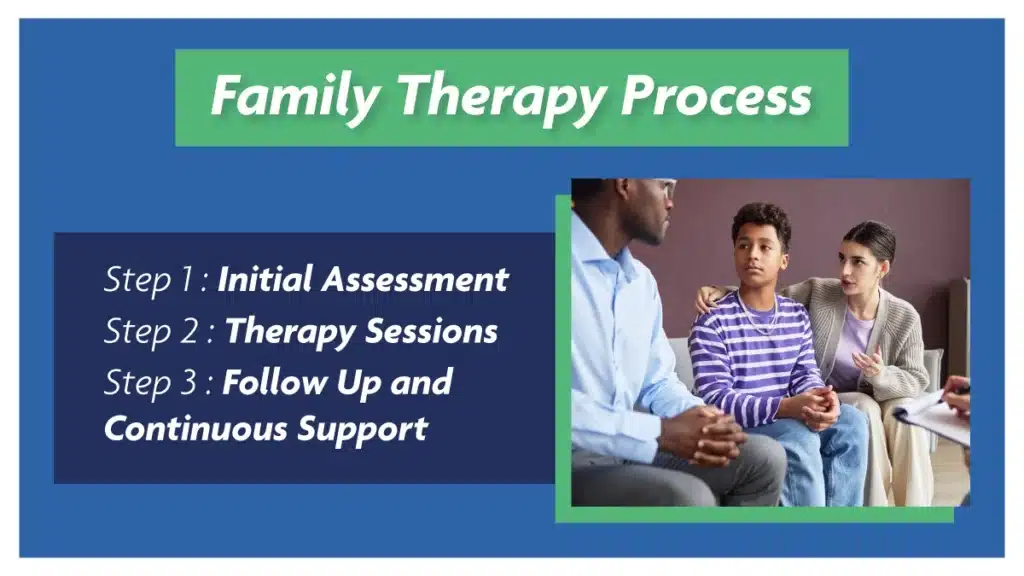Family Therapy For Teen Drug Addiction
When a teenager is caught in the grip of alcohol and drug addiction, the whole family feels the impact. The associated stress, worry, and confusion can overwhelm everyone involved. In such trying circumstances, family therapy steps in as a powerful ally.
Family therapy provides a safe space for families to address the underlying issues contributing to the teen’s substance abuse. Involving all family members in the healing process promotes empathy, trust, and resilience within the family unit. Read on to learn more.
Key Takeaways
Family therapy is a great tool for addressing teen drug addiction, involving the entire family in the healing process. Here is what you need to know:
- Family therapy provides a safe space for families to address the complex dynamics contributing to teen drug addiction.
- The process of family therapy in addiction treatment follows a structured approach that often begins with an initial assessment.
- Various approaches to family therapy exist, with each supporting families dealing with teen drug addiction differently.
Don’t hesitate to seek professional help for your teen’s substance use disorder (SUD). Contact our teen treatment facility at (845) 479-6888 today for more information.

Introduction To Family Therapy
Family therapy, or family counseling, is a collaborative approach that involves the entire family in the recovery process of a teen struggling with substance abuse. It recognizes that addiction not only affects the individual but also has profound impacts on family dynamics and relationships.
Family therapy focuses on fostering open communication, understanding underlying issues, and building a supportive environment for recovery. Therapists work with the family to identify dysfunctional patterns, address conflicts, and develop healthier coping mechanisms.
One of the key aspects of family therapy is education about addiction and its effects on the family unit. By gaining knowledge about addiction, parents and loved ones can better understand the challenges their teen is facing and learn how to provide adequate support.
Additionally, family therapy offers a safe space for everyone to express their feelings, concerns, and experiences related to addiction. This process helps to strengthen family bonds, rebuild trust, and promote healing for both the individual struggling with addiction and their loved ones.
Overall, family therapy sessions offer a holistic approach to addressing drug addiction by involving the entire family in the recovery journey, ultimately increasing the likelihood of long-term success and well-being for everyone involved.
The Process Of Family Therapy
When seeking help for teen drug addiction, family therapy follows a structured process aimed at providing comprehensive support and guidance. Here’s the overview of the process:
Initial Assessment
In the initial assessment phase, trained therapists engage with the teen and their family members to comprehensively evaluate the dynamics at play. This involves gathering information about the teen’s substance use history, family dynamics, and any underlying issues contributing to the addiction. Through compassionate dialogue and careful observation, therapists gain insights essential for tailoring the treatment approach to the family’s unique needs.
Therapy Sessions
Therapy sessions offer a safe space for open communication and exploring underlying issues. Using evidence-based techniques, therapists facilitate constructive dialogue to foster understanding, empathy, and healing within the family unit. Teens are encouraged to express their thoughts and feelings while learning effective coping mechanisms and communication skills. Family members also receive guidance on setting boundaries, practicing self-care, and rebuilding trust.
Follow-Up Sessions And Continuous Support
Following the initial therapy sessions, regular follow-up sessions are crucial for monitoring progress and addressing emerging challenges. These sessions provide ongoing support, reinforcement of coping strategies, and adjustment of treatment plans as needed. Additionally, families are connected with external support networks, such as support groups or community resources, to bolster their journey toward sustained recovery.
Following the structured approach, family therapy provides support, insight, and skills to help the affected teen and their family members.
Approaches To Family Therapy
When a teen struggles with addiction, it’s not just the individual who needs support but the entire family unit. Here are some approaches to family therapy that can help parents and loved ones navigate this challenging journey:
Family Systems Therapy
This approach views the family as a complex system with its own set of rules, roles, and dynamics. Therapy focuses on understanding and addressing how these dynamics contribute to the teen’s substance abuse and addiction.
Structural Family Therapy
This approach emphasizes the family’s structure and organization. The therapist helps restructure the family dynamics to promote healthier interactions and support systems for the teen, often by clarifying roles and boundaries.
Strategic Family Therapy
In this approach, therapists focus on creating specific interventions to bring about change in family interactions and dynamics related to substance abuse. The therapy is goal-oriented and seeks to disrupt negative patterns.
Multidimensional Family Therapy (MDFT)
MDFT addresses various aspects of the teen’s life, including family dynamics, peer relationships, and individual factors contributing to alcohol and drug abuse. It’s comprehensive and tailored to the specific needs of the teen and their family.
Cognitive-Behavioral Family Therapy (CBFT)
CBFT combines cognitive-behavioral techniques with family therapy principles. It helps family members identify and change negative thought patterns and behaviors contributing to the teenager’s substance abuse and addiction.
Attachment-Based Family Therapy (ABFT)
This approach focuses on repairing and strengthening the attachment bonds between family members, especially parents and teens. It aims to create a secure emotional connection as a foundation for addressing substance abuse issues.
Community Reinforcement And Family Training (CRAFT)
CRAFT empowers families to influence their teen’s behavior without confrontation positively. It teaches communication skills, positive reinforcement strategies, and ways to encourage the teen’s engagement in treatment.
Solution-Focused Brief Therapy (SFBT)
SFBT emphasizes identifying and building on the family’s strengths and resources to create solutions. Therapists help the family envision a future without drug and alcohol abuse and work collaboratively to achieve those goals.
Psychoeducation And Support Groups
Providing education about substance abuse, its effects, and available resources can empower families to support their teens better. Support groups offer a safe environment for sharing experiences and receiving guidance from others facing similar challenges.
Each of these approaches offers unique strategies and techniques to empower parents and loved ones in supporting their teen’s journey to recovery from drug addiction.
Benefits Of Family Therapy
Family therapy programs offer a range of benefits that contribute to the individual’s recovery and the well-being of the entire family unit. Here are some of the benefits:
Education and Understanding
Family therapy provides a platform for family members to gain insights into addiction, its causes, and its impact on the teen’s life. Understanding the underlying issues behind substance abuse helps family members approach the situation with empathy and knowledge.
Strengthening Family Bonds
Through therapeutic interventions, families can mend fractured relationships and rebuild trust. This process fosters a supportive environment where teens feel understood, valued, and connected to their loved ones, essential for long-term recovery.
Improved Communication
Effective communication is key to addressing conflicts and resolving misunderstandings within the family dynamic. Family therapy equips participants with tools to express emotions, concerns constructively, and needs constructively, fostering healthier interactions and relationships.
Reducing Enabling Behaviors
Family therapy sessions help family members identify and address enabling behaviors that unintentionally lead to substance abuse. By setting boundaries and holding the teen accountable, families can create a supportive but non-permissive environment conducive to recovery.
Building Coping Skills
Teens facing addiction often lack healthy coping mechanisms to manage stress, triggers, and cravings. Family therapy teaches practical coping skills and strategies that empower adolescents and their family members to navigate challenges effectively.
Improving Treatment Outcomes
When families actively participate in the recovery process, treatment outcomes significantly improve. Family therapy enhances the effectiveness of other interventions by addressing systemic issues and providing a strong support network for the teen’s ongoing sobriety.
In short, a family therapy program is an integral component of drug addiction treatment for teens, promoting healing, resilience, and growth within the family unit.
Frequently Asked Questions (FAQ)
What is the role of the family in preventing addiction?
The family plays an essential role in preventing addiction by providing support, guidance, and a stable environment. Parents can communicate openly with their children about the risks of substance abuse, set clear boundaries, and encourage healthy habits.
Spending quality time together strengthens family bonds, reducing the likelihood of turning to drugs for solace. By fostering a loving and nurturing atmosphere at home, families can instill resilience and coping skills in their members, helping them make positive choices and avoid the pitfalls of addiction.
What is the role of the family in the addiction recovery process?
In addiction recovery, the family plays an important part. They provide support, love, and encouragement, which are essential for the person struggling with addiction. Families can create a safe and understanding environment where the individual feels accepted and motivated to seek help.
Families can strengthen recovery by offering emotional support, listening without judgment, and participating in therapy sessions or support groups. Additionally, they can help establish healthy boundaries and promote positive behaviors that support sobriety.
Does counseling work for drug addiction?
Counseling can be effective for drug addiction. It provides guidance and support to individuals struggling with addiction, helping them understand the root causes of their substance abuse and develop coping skills to overcome cravings and triggers.
Counselors use various techniques like cognitive behavioral therapy (CBT) to address addiction-related issues and promote long-term recovery. By working closely with a counselor, individuals can gain insight into their behaviors, learn healthier coping skills, and build a strong support network to maintain sobriety.
Guiding Teens Toward A Brighter Tomorrow
Parents, if your teen is struggling with drug or alcohol use disorder, don’t wait to seek professional help. Our teen rehab facility offers a residential rehab program to support your teen on their journey to recovery.
Our program incorporates various therapeutic approaches, including individual counseling, group therapy, and family programs. We also provide educational workshops and recreational activities such as art and music therapy to engage and inspire your teen.
Contact us at (845) 479-6888 today to learn more about how we can help your teen break free from substance addiction and start living a healthier life.


